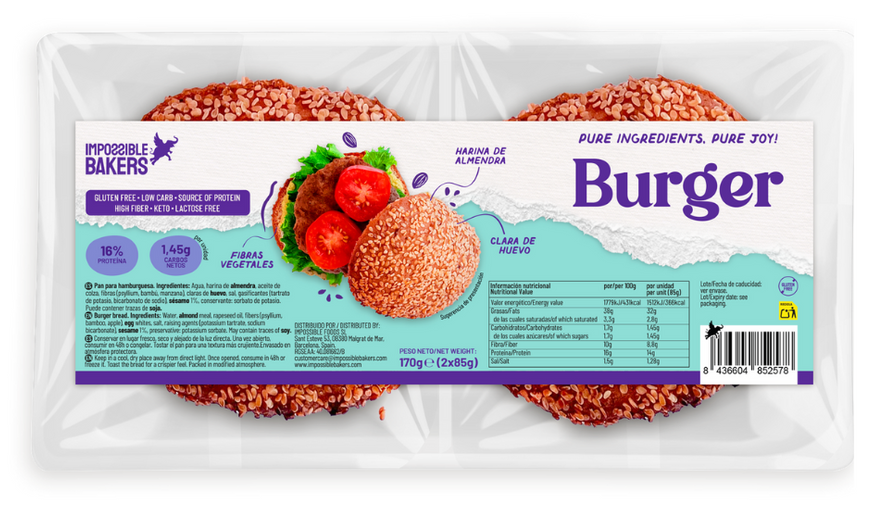
Ahead of its expected EU launch this year, plant-based meat giant Impossible Foods has lost a four-year trademark battle with an independent bakery from Spain.
Impossible Foods, the California-based producer of meat alternatives, has been dealt a blow by an EU court over its trademark fight with a Spanish bakery.
The court in Strasbourg ruled that Impossible Bakers’ brand is distinct enough from the plant-based meat maker, rejecting the trademark infringement claim it brought in 2021.
After assessing both sides’ claims, the court decided that Impossible Foods’s appeal “must be rejected as unfounded” and “dismissed in its entirety”.
Why Impossible Foods lost its trademark case

The case began when Impossible Foods filed an opposition to Impossible Bakers’ trademark application. The motion was rejected by the EU Intellectual Property Office (EUIPO) in December 2023, prompting the US company to take the matter to the EU General Court in February 2024, asking for an annulment of the decision under EU Trademark Regulation.
The bakery was looking to trademark its brand for cakes, candies, pastries and retail products. But Impossible Foods objected to its use of the word ‘Impossible’, citing consumer confusion.
However, the Barcelona-based business’s flying elephant logo, stylised lettering, and emphasis on the word ‘Bakers’ over ‘Impossible’ differentiated it enough from the vegan meat’s own ‘Impossible’ logo, the court found.
“Despite the similarities created by the element ‘impossible’, the signs were visually similar to a low degree, in the light of their different structure and the fact that there were several visual differences between them,” it said.
This included the bakery’s use of an inverted ‘ss’ in its logo, as well as the “significantly smaller” font size for ‘Impossible’ compared to the word ‘bakers’, which carried greater weight. It was the latter word and the flying elephant logo that “attracted the attention of customers”.
The judge further noted that food products are purchased in visually driven retail environments, which lowers the risk of confusion among customers.
“Even if some of the goods at issue were considered to be identical, it should be noted that, following a global assessment, the Board of Appeal correctly found that there was no likelihood of confusion,” it said.
Impossible Foods’s vegan burger launch imminent in Europe

As a result of the case, the court asked Impossible Foods to cover the bakery’s legal costs. And while it can appeal the decision to the EU’s highest court, it hasn’t done so just yet. It marks a rare loss in the plant-based meat company’s IP battles.
In 2020, it won a case against Nestlé’s ‘Incredible Burger’, which was renamed ‘Sensational Burger’ after a Dutch court found the words ‘Impossible’ and ‘Incredible’ too similar in sight, sound and meaning. Last year, the company settled a patent lawsuit with Boston-based Motif Foodworks and took over its heme business, which shut down days later.
Impossible Foods has also been engaged in a long-running conflict with wellness company Impossible X, which it sued in 2021 after the latter’s founder, Joel Runyon, demanded it limit its use of ‘Impossible’ to plant-based food in a cease-and-desist letter. The case is ongoing.
And earlier this year, the European Patent Office’s Board of Appeals reinstated a key patent it had revoked in 2023, which related to the heme protein and flavour precursors in its flagship burger.
The EU court’s decision over its trademark fight with Impossible Bakers comes amid the backdrop of the impending launch of the Impossible Burger in the region. Its use of soy leghemoglobin – a precision-fermented heme protein – has kept its signature beef alternatives out of Europe for almost a decade.
The company first filed for approval of the ingredient in March 2021. Last year, the EFSA Panel on Food Additives and Flavourings issued a positive safety assessment of LegH Prep, a liquid preparation containing soy leghemoglobin and other ingredients.
Months later, a ruling by the regulator’s GMO panel called soy leghemoglobin “safe for human consumption with regard to the effects of the genetic modification”. The EFSA’s opinion was followed by a period of public consultation ahead of final approval by the EU Commission and member states. And this February, the EFSA stated that the public comments didn’t raise any further concerns, moving Impossible Foods closer to commercialising.
“When it comes to food and the health of people and the planet, the government should have a keen interest in that,” Impossible Foods CEO Peter McGuinness told Bloomberg last month, forecasting a European launch this year. “The flip side of that is we’ve been trying for four years to get Impossible in [Europe], and we’re still not there yet. But we’re waiting patiently impatiently.”
The post Impossible Foods Loses EU Trademark Battle with Spanish Bakery appeared first on Green Queen.
This post was originally published on Green Queen.